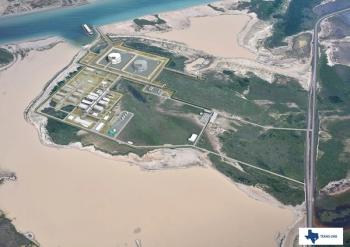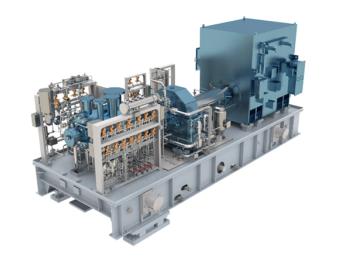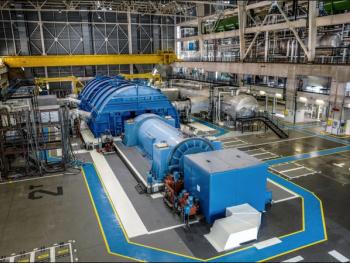
Biden’s LNG Pause Causes Controversy at Baker Hughes Annual Meeting
Several speakers and panels at the Baker Hughes Annual Meeting took issue with President Biden’s pause on LNG licensing.
Last week, President Biden announced a pause on all new LNG permitting approvals in the United States. Done without warning, this sent shockwaves through the oil and gas world. Turbomachinery orders could be delayed or cancelled and major projects that have already attracted heavy investment could be in jeopardy.
"During this period, we will take a hard look at the impacts of LNG exports on energy costs, America's energy security, and our environment," said President Biden.
Several speakers and panels at the Baker Hughes Annual Meeting (AM) in Florence, Italy this week took issue with the announcement.
“We are disappointed with today’s announcement by the Administration to disrupt the growth of U.S. LNG—which has been one of the most transformative energy success stories of this century,” said Lorenzo Simonelli, CEO of Baker Hughes. “We strongly oppose this moratorium and call on the administration to approve pending export applications with no further delays.”
Mike Sommers, President & CEO, American Petroleum Institute, called it the worst energy decision made so far by the current administration.
“It is a win for Russia, and a loss for U.S. allies, American jobs, and global climate goals,” said Sommers. “European and other allies are begging for U.S. LNG, so this undermines world security at a time when energy demands are rising.”
Paul Marsden, President of Bechtel Energy, has a more philosophical response. “This too shall pass,” he said, while pointing out the potentially devastating impact on jobs along the Gulf Coast.
Jack Fusco, President and CEO of Cheniere Energy, the top U.S. exporter of LNG, found the reasoning behind the announcement confusing. He rebutted its claims about potential price rises and environmental impact. He noted that CO2 levels in the United States reached an all-time high in 2007 and are down 15% since then due to coal-to-gas switching and despite rising energy usage and massive exports of LNG. His company sent its first LNG tanker to Korea in 2016. Since that time, more than 3,000 more tankers have exported U.S. LNG.
“The price of natural gas is the same as it was despite the huge increase in exports,” said Fusco. “I am hopeful this is a short-term pause.”
Net Power’s CEO Danny Rice commented that the LNG approval pause could cause other countries to revert to coal.
Dr. Jörg Kukies, State Secretary for Economic Policy and European Affairs, German Chancellery, expressed concern about security of supply. Germany used to receive 55% of its natural gas from Russia. That number is now zero. U.S. LNG exports played a big part in keeping the lights on and industry running.
“U.S. support was essential for us,” said Kukies.
Valentino Valentini, Italian Deputy Minister at the Ministry of Enterprise and Made in Italy, added that Italy had to recover from losing one-third of its total oil and gas imports from Russia. LNG was crucial in filling the gap. He noted that LNG has transformed the gas industry from a local issue to a global concern.
“The United States has become the Saudi Arabia of gas. The global system is interconnected and needs certainty,” said Valentini. “We must be gradual in our energy transition and also make it economically viable.”
The Administration Counters
Brad Crabtree, Assistant Secretary for the Department of Energy’s (DOE) Office of Fossil Energy and Carbon Management (FECM), found himself in the hot seat at the Baker Hughes AM. Speaking on a panel on government policy, which turned into a discussion on President Biden’s announcement, he emphasized the essential role natural gas plays in the world. He assured attendees that the administration would not allow any slowdown of urgently needed supplies to allies in Europe.
Crabtree added that the United States currently exports 14 billion cubic feet of LNG per day. “Up to 48 billion cubic feet per day of LNG projects have already been authorized,” said Crabtree. “The pause does not include any of that. The decision does not impact projects now or over the near term.”
By 2030, the United States will be by far the biggest LNG exporter on the globe, he added. By then, it will produce 50% more LNG than Qatar, the second-place LNG producer.
“During the pause, the administration is conducting a robust analysis of the market and domestic, international, and environmental needs in order to make the right decision,” said Crabtree.
LNG Policy Pivot or Pause?
Some AM panelists considered the LNG pause to be a political tactic to gain support among climate activists and delay decisions on new LNG plants until after the Nov. 5 election. Statements from the White House indicate that the motivations included climate change, protecting the environment, and keeping domestic gas prices low.
“Today, the Biden-Harris Administration is announcing a temporary pause on pending decisions on exports of Liquefied Natural Gas (LNG) to non-FTA countries until the Department of Energy (DOE) can update the underlying analyses for authorizations. The current economic and environmental analyses DOE uses to underpin its LNG export authorizations are roughly five years old and no longer adequately account for considerations like potential energy cost increases for American consumers and manufacturers beyond current authorizations or the latest assessment of the impact of greenhouse gas emissions.”
(Free Trade Agreement or FTA countries include Canada, Mexico, Korea, and a few others. Europe and Japan are non-FTA countries).
There was an attempt by Crabtree to downplay the impact. But several meaty projects have been left in limbo.
Commonwealth LNG’s 9.3 million metric tonnes per annum (mtpa) LNG export facility in Cameron, Louisiana has been stalled on approval since late 2022. The company has already signed long-term supply agreements for around 50% of this capacity.
Sempra's LNG trains 3 and 4 in Port Arthur, Texas (13.5 mtpa), have been waiting for authorization since September 2023. This adds to trains 1 and 2 which are already operational.
Energy Transfer’s Lake Charles LNG facility in Louisiana reapplied in August 2023 after its original permit expired before construction could be completed.
Magnolia LNG (developed by Glenfarne Group (8.8 mtpa) in Louisiana is another incomplete project that has refiled its permits.
Venture Global LNG has proposed a 20 mtpa expansion of its existing Calcasieu Pass project in Louisiana. The Calcasieu Pass 2 plant awaits FERC approval prior to applying for permits from the DOE. Similarly, Cheniere Energy is adding Trains 8 and 9 to its existing Midscale LNG project and awaits FERC approval.
That’s a lot of mega-projects that have already burned through plenty of investment dollars. If these projects are left waiting indefinitely or eventually canceled, it does not bode well for future investment in large-scale U.S. energy infrastructure.
Newsletter
Power your knowledge with the latest in turbine technology, engineering advances, and energy solutions—subscribe to Turbomachinery International today.




